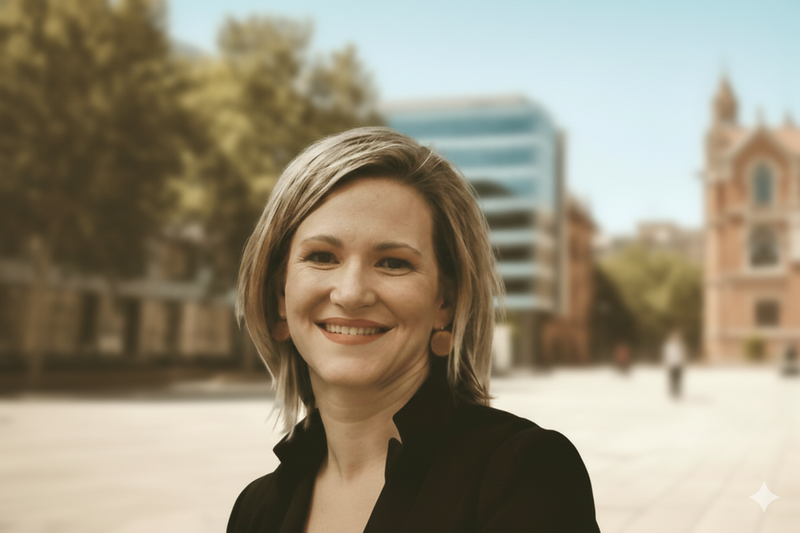From Goals to Global Impact: An interview with Audrey Sawyer
Oct 01, 2025
This interview features Dr. Audrey Sawyer, a U.S. based researcher currently working at the UPC in Barcelona
This interview features Dr. Audrey H. Sawyer, a distinguished U.S. hydrogeologist with extensive experience in surface water–groundwater interactions and environmental fluid dynamics.
Currently a Distinguished Investigator at the Universitat Politècnica de Catalunya (UPC) in Barcelona, Dr. Sawyer leads innovative research on river contaminants, coastal aquifers, and hyporheic exchange. Her work integrates experiments, field observations, and modeling to address critical environmental challenges, supported by nearly one million euros in funding. She has published over 60 peer-reviewed articles and received several awards, including the NSF CAREER Award and the Geological Society of America’s Kohout Early Career Award. Dr. Sawyer shares her strategies for career development, mentoring, and the value of cultural competence, offering valuable insights for researchers navigating academic life.
Understanding Your Career
Can you describe the tools or strategies you use for self-assessment in your research?
I evaluate my research performance and progress based on grants, publications, and supervision of students and postdocs. To me, success means maintaining an active research group and continuing to disseminate our group’s work through peer-reviewed publications.
How have your motivations changed as your career has progressed?
I’m now more aware of the value of mentoring and believe it is one of the most important contributions researchers can make in academia.
Career Development Planning
How do you identify and set professional goals for yourself?
I look at researchers I admire who are about five years ahead of me and try to follow the parts of their paths that inspire me. There are many ways to succeed in research, but if I see several colleagues pursuing a similar funding call or service role that sounds exciting, I make it a goal to try.
Once you have set a goal, what steps do you take to ensure you will meet it?
I set deadlines for myself on my calendar and make lots of lists. I enjoy crossing things off once they’re done.
How do you monitor and adjust your action plan to stay on track toward your goals?
I stay flexible and let the science drive the plan because research is unpredictable. For example, in hydrology, you might plan to study floods but end up in a drought. If a planned experiment isn’t working, I adapt the approach so I can still produce knowledge — I may adjust the driving question or add a new set of models. I try to be opportunistic.
Career Progression and Transition
What strategies do you use to enhance your research output?
I make sure each person on my team has a publishable product they are responsible for. This helps them grow professionally and creates accountability for the project and the team.
What skills have you gained from academia that are transferable to other industries?
I’ve gained resilience, as science rarely goes as expected, and we constantly face peer review. I’ve developed management and mentoring skills I’m still refining. I’ve also gained technical skills that apply to many STEM fields, though they require constant updating — which keeps me humble.
How do you evaluate the pros and cons of academic versus non-academic career paths?
An academic career has been brutal at times but also flexible. I’m grateful to have been able to have a family while pursuing an intellectually stimulating and rewarding career.
Career Support and Resources
Have you participated in professional development programs, and how have they influenced your career growth?
I took a team leadership course for researchers, which was fantastic. It helped me understand my mentoring style and how to nurture a dynamic lab group.
What qualities and skills do you think a good mentor should have?
Some of my best mentors gave me resources to learn important skills and helped expand my network so I felt part of a larger community.
Mobility, Multiculturalism & Language Courses
What role does cultural competence play in international collaborations?
Cultural competence is essential for international collaborations and innovation. Complex interdisciplinary problems (climate change, cancer) affect people globally, and the best solutions come from diverse teams. Cultural competence helps teams understand each other and leverage unique perspectives.
What do you think about knowledge of the local language being a requirement for promotion in your academic career?
Learning the local language is a time investment worth making. It helps connect with the research community and gain new perspectives on the world we live and work in. Language helps us put down roots in our academic home.
How have language skills impacted your professional development and career opportunities?
Learning the local language has been enriching and fun, though slow and humbling. It has improved my ability to work in collaborative teams and deepened my sense of belonging to a research community.

Share: